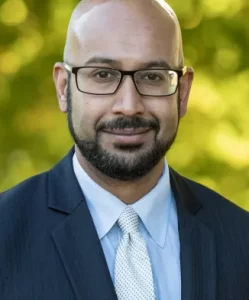Work-hours and depression in first-year resident physicians
Video by Eric Shaw
In an “emulated” clinical trial, longer work weeks were strongly linked to a larger rise in depression symptoms, pushing some first-year resident physicians into moderate or severe depression range, according to a team of researchers at the University of Michigan.
“This analysis suggests strongly that reducing the average number of work hours would make a
difference in the degree to which interns’ depressive symptoms increase over time, and reduce
the number who develop diagnosable depression. The key thing is to have people work fewer
hours; you can more effectively deal with the stresses or frustrations of your job when you have
more time to recover.”
Article by Kelsey Keeves
 Srijan Sen
Srijan Sen
Frances and Kenneth Eisenberg Professor of Depression and Neurosciences
Director, Frances and Kenneth Eisenberg and Family Depression Center
Professor, Psychiatry
Research Professor, Michigan Neuroscience Institute
Depression affects about five percent of adults worldwide, according to the World Health Organization, and can have devastating effects on the lives of those who suffer.
Researchers at the University of Michigan Frances and Kenneth Eisenberg Family Depression Center are leading a number of innovative projects to address this important global health issue. Srijan Sen, the Director of the Center, believes that interdisciplinary research in this area has great promise and is urgently needed and that the University is ideally suited to lead such work.
“The pandemic has made clear how many aspects of our lives affect our mental health and wellbeing. Certainly, formal treatments like medications and therapy are important. But also our social connections, how we sleep, eat and exercise, our political and built environments, schools and workplaces.”
“Perhaps the distinguishing feature of the University of Michigan is the breadth of incredible expertise that we have across fields. One of our goals at the center is to bring leaders who may not have seen themselves as depression researchers into the field, empower both long-time and new depression scholars to carry out and collaborate on transformative work to understand how our brain circuits work, advance cutting-edge new treatments, develop new sensors for how we feel stress and fatigue and understanding how poverty and the environmental factors affect us and so much more.”
A project that Sen is leading through the Eisenberg Depression Center follows training physicians as they enter the stressful period of residency training. The project led to the recent study in The New England Journal of Medicine strongly linking long work hours and depression.
“Long work hours in physicians are the type of upstream structural factor that we can target to help reduce the development of depression”.
His work also focuses on how an individual’s genetics can help researchers better understand personal reactions to the environment. He is hopeful that recent progress made in genomics, combined with the increasing accuracy and abilities of wearable technology, can contribute to future preemptive mental health treatment tactics.
“Some of us may be really sensitive to not getting enough sleep. For others, not enough social interactions can be a trigger. For others, it’s not getting a chance to work out. If we can understand the triggers that each person is most sensitive to, we can more effectively prevent depression”
Sen received both his M.D. and Ph.D. from U-M, and after completing his postdoctoral training in psychiatry at Yale University, he returned in 2009 as an assistant professor. He served as associate director before becoming director of the center in 2021.
“In the 13 years I’ve been back, I’ve worked with people in so many different departments, looking at everything from gender differences and economics and engineering, things that I am not an expert in, but am able to do really high-level work in because I get to work with the experts here.”
To Sen, the most important aspect of his role as director of the center is the ability to bring together different researchers from across the university.
“I’m excited to do more with physicians, but also apply that to the workforce more generally, to college students and high-school students and so many other groups that need help.”
